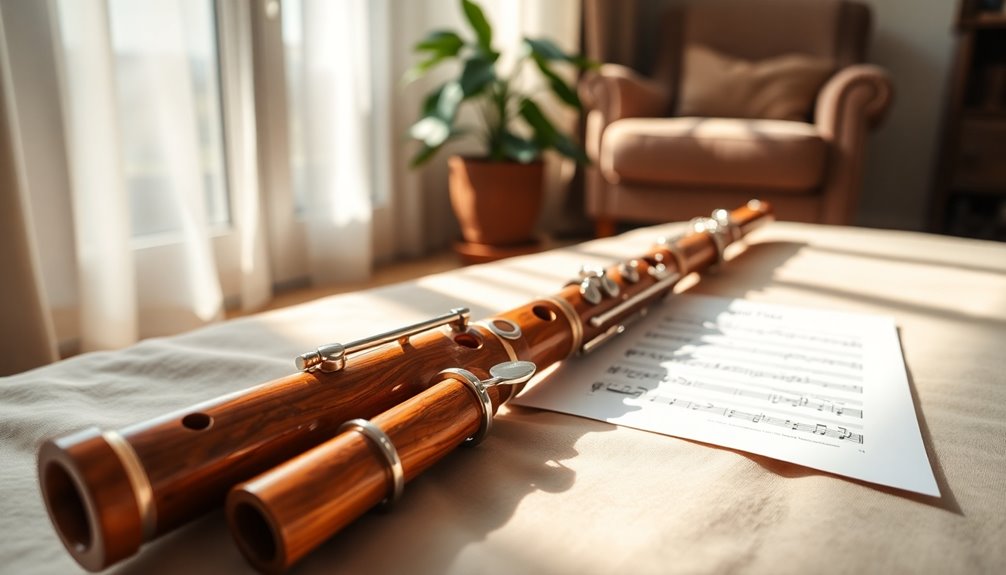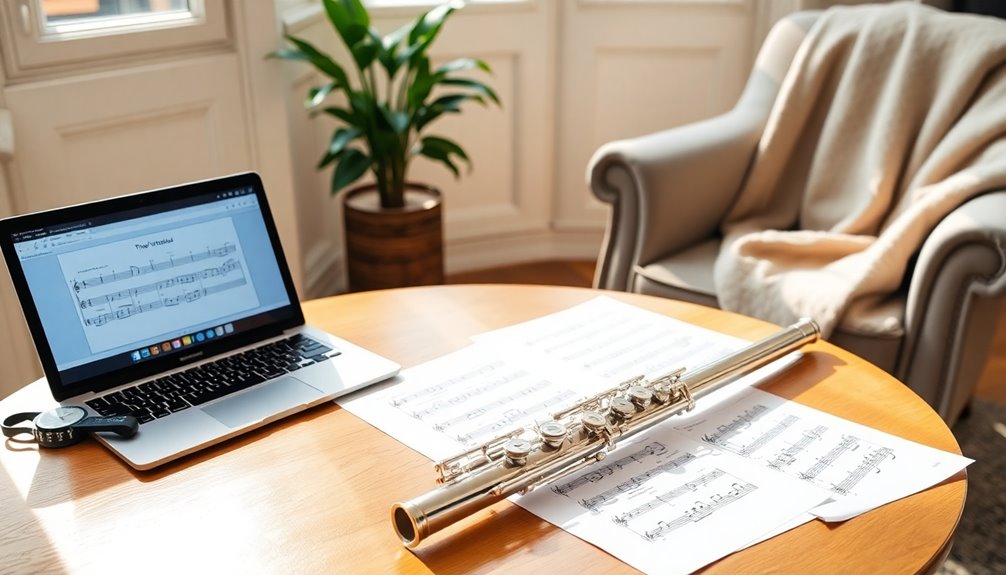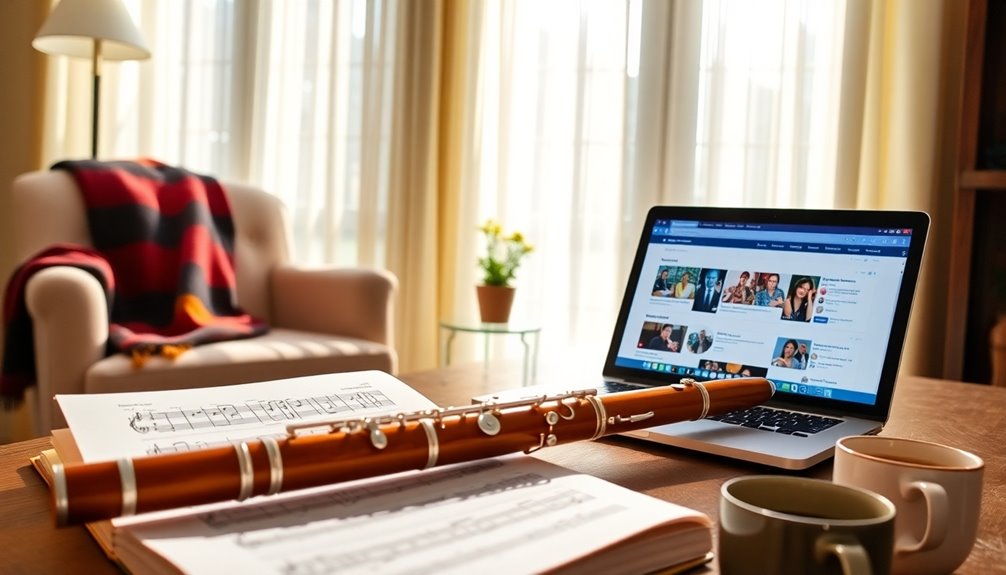To learn flute at home effectively, start by choosing the right instrument that suits your budget and skill level. Set up a consistent practice schedule, focusing on shorter sessions to build routine. Utilize online resources like video tutorials and apps for additional guidance and support. Pay attention to proper technique, ensuring good breath control and relaxed finger positioning for improved sound. Finally, join a community or forum where you can share experiences, ask questions, and celebrate progress with others. By incorporating these tips, you'll enhance your learning experience, and more insights await you as you explore further.
Key Takeaways
- Choose a silver-plated student flute for affordability and ease of play as a beginner.
- Establish a consistent practice schedule, dedicating short sessions to warm-ups, technique, and repertoire.
- Utilize online resources like video tutorials and apps for guided practice and skill development.
- Focus on proper technique, including breath control and relaxed finger positioning, to enhance sound quality.
- Join online communities or forums to share experiences, seek support, and celebrate progress with other flutists.
Choose the Right Flute

Choosing the right flute is crucial for your journey into music. It's not just about picking any instrument; it's about finding one that resonates with you and fits your needs. There are several flute types to reflect upon, each suited for different skill levels and musical styles.
For beginners, a silver-plated student flute is a great choice due to its affordability and ease of play. If you're more advanced, you might explore the options of professional flutes, which offer richer tones and more advanced features.
When you think about flute types, don't overlook the material. While student flutes are often made from silver-plated metal, professional models may incorporate solid silver or even gold, affecting both sound quality and price.
It's important to balance your desire for quality with your budget considerations. Determine how much you're willing to invest, as this will guide you toward the right model without stretching your finances too thin. Consider brands like Yamaha Flutes, which are highly recommended for their reliability and ease of play, making them perfect for novices.
Visit local music shops or check online retailers, and try out different flutes. Don't hesitate to ask for expert advice; they're there to help you find the best fit.
Remember, the right flute can make learning more enjoyable and fulfilling. You want an instrument that not only sounds good but feels good in your hands.
Take your time, explore your options, and soon enough, you'll find the flute that feels just right for you. Happy playing!
Set Up a Practice Schedule

Establishing a consistent practice schedule is essential for your development as a flutist. By setting aside dedicated time for daily practice, you'll not only improve your skills but also build a sense of routine that can enhance your musical journey.
Start by evaluating your current commitments—identify pockets of time during your day when you can focus solely on playing the flute. Aim for short, focused practice sessions rather than long, unproductive ones. Even 20 to 30 minutes a day can yield significant progress if you stay consistent.
Break down your practice into manageable segments: warm-ups, technique exercises, and repertoire. This structured approach not only keeps you engaged but also guarantees you're covering all the necessary aspects of flute playing.
Time management is key here. Use a planner or digital calendar to block off your practice times, treating them like important appointments. Consistency helps you develop muscle memory and reinforces what you've learned, making your practice sessions more effective. Additionally, consider tracking your progress in a practice journal to reflect on your achievements and areas for improvement.
Don't forget to be flexible. Life can get busy, and it's okay to adjust your schedule when needed. If you miss a day, just get back on track the next.
Remember, every flutist has days when motivation dips—what matters is your commitment to return. By establishing a practice schedule, you're not just learning an instrument; you're joining a community of musicians dedicated to growth and creativity.
Keep playing, stay focused, and enjoy the journey!
Utilize Online Resources

A wealth of online resources is available to help you enhance your flute skills from the comfort of your home. You're not alone on this journey! With just a few clicks, you can access a variety of tools that cater to all levels, from beginners to advanced players.
Start by exploring video tutorials. Platforms like YouTube have countless channels dedicated to flute instruction. You'll find everything from basic finger placements to advanced techniques. Watching experienced flutists can inspire you and provide visual guidance that makes learning easier. Take notes, pause, and practice along with the videos to reinforce your understanding.
In addition to video tutorials, don't overlook the power of interactive apps. Many apps are designed specifically for musicians, offering features like metronomes, tuners, and practice exercises. Some even provide feedback on your playing, allowing you to track your progress effectively. Finding an app that resonates with you can make practice sessions more engaging and fun.
Joining online communities can also enhance your learning experience. Consider participating in forums or social media groups where fellow flutists share tips, challenges, and support. The sense of belonging can motivate you to stay committed to your practice. Additionally, take advantage of community engagement opportunities to connect with other learners and gain valuable insights from shared experiences.
Focus on Proper Technique

Mastering the flute requires a strong foundation in proper technique. Focusing on your breath control and finger positioning will greatly enhance your playing experience. Here are some essential tips to keep in mind:
- Breath Control: Practice taking deep breaths from your diaphragm. This will help you produce a steady and strong sound, which is vital for playing melodies smoothly.
- Finger Positioning: Make sure that your fingers are curved and relaxed while on the keys. Proper finger positioning not only improves your speed but also enhances your overall sound quality.
- Posture: Maintain a straight back and relaxed shoulders while playing. Good posture allows for better airflow and helps you avoid strain during practice.
- Consistent Practice: Dedicate time daily to focus on your technique. Even short, focused sessions can lead to considerable improvements over time. Additionally, incorporating diaphragmatic breathing techniques can significantly enhance your breath support during practice.
Join a Community or Forum

Joining a community or forum dedicated to flute playing can greatly enhance your learning experience. When you connect with fellow flute enthusiasts, you open the door to a wealth of knowledge and encouragement that can greatly boost your skills. These communities provide support, share tips, and celebrate each other's progress, which can be incredibly motivating.
One of the primary community benefits is access to diverse perspectives. Whether you're a beginner or an advanced player, engaging with others can lead to valuable insights. You can ask questions about technique, get recommendations for practice materials, or even find someone to play duets with online. This interaction fosters a sense of belonging, making you feel less isolated on your musical journey.
Online support is another invaluable aspect of joining a flute community. Many forums host discussions about challenges you might face, from mastering difficult pieces to overcoming performance anxiety. Hearing others share their experiences can reassure you that you're not alone in your struggles. Additionally, being part of a flute ensemble can provide a supportive environment that nurtures teamwork and communication among musicians.
Finally, participating in a community can lead to lasting friendships. Sharing your passion for the flute with others creates bonds that extend beyond music.
Frequently Asked Questions
What Is the Best Age to Start Learning the Flute?
The best age to start learning the flute often falls between 8 and 12 years old, though it can vary.
Starting young allows you to enjoy the flute benefits, like improved coordination and musical skills.
However, if you're older, don't hesitate! Many adults thrive in learning too. Embrace your passion, and you'll find a welcoming community.
Regardless of age, the joy of playing can be a lifelong journey that brings you closer to others.
How Long Does It Take to Learn Basic Flute Skills?
Learning basic flute skills is like planting a garden. With consistent practice routines and effective techniques, you'll see your progress blossom.
Typically, you might need a few months to grasp the fundamentals, but remember, growth varies for everyone. Don't rush; nurture your skills daily, and you'll flourish.
Embrace the journey, connect with others, and celebrate each small victory. Each note you play brings you closer to the musician you aspire to be!
Are There Specific Brands of Flutes Recommended for Beginners?
When you're starting out, choosing the right flute brand can make a huge difference.
Beginner flute brands like Yamaha, Jupiter, and Gemeinhardt are often recommended for their quality and playability.
Flute brand comparisons reveal that these options provide a good balance between affordability and sound.
As you explore these brands, you'll find one that feels right for you, helping you build confidence and enjoy your musical journey.
Keep experimenting, and you'll discover what suits you best!
How Can I Improve My Breath Control for Flute Playing?
To improve your breath control for flute playing, start incorporating breath exercises into your routine.
Focus on engaging your diaphragm; it's essential for strong, steady airflow.
Try inhaling deeply through your nose, then exhaling slowly while making a sustained tone on your flute.
Gradually increase the duration of your exhalations.
Consistent practice will build your diaphragm strength, making your playing smoother and more controlled.
What Common Mistakes Should I Avoid as a Beginner Flutist?
As you immerse yourself in the world of flute playing, avoid the traps of poor finger placement and slouched posture that could turn your melodious dreams into squeaky nightmares.
Make sure your fingers dance gracefully over the keys, and align your posture like a proud tree reaching for the sky.
Embrace these tips, and you'll not only sound better but feel more confident.
Conclusion
By choosing the right flute, setting up a practice schedule, utilizing online resources, focusing on proper technique, and joining a community, you're laying the groundwork for your success. Remember, each practice session brings you closer to mastery. Embrace the challenges, celebrate your progress, and stay connected with fellow learners. With dedication and the right approach, you can transform your flute playing from a hobby into a fulfilling passion. Keep playing, keep learning, and most importantly, keep enjoying the journey!






